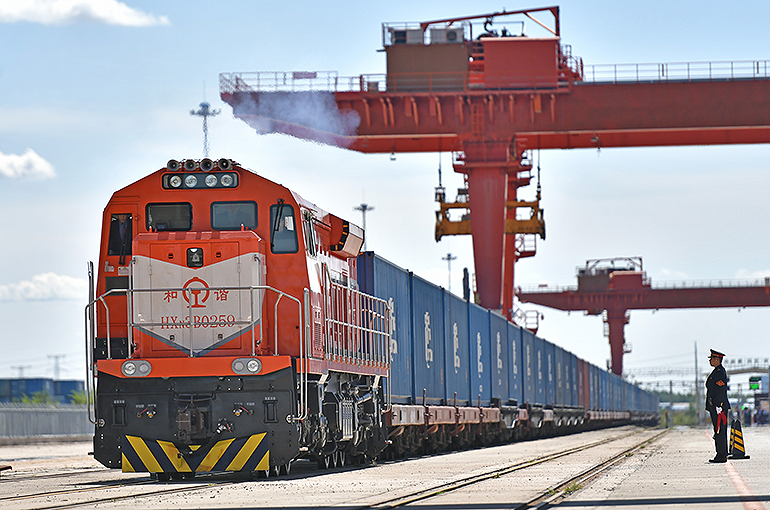 China-Europe Freight Trains Act as ‘Bridge’ in Global Trade, NDRC Official Says
China-Europe Freight Trains Act as ‘Bridge’ in Global Trade, NDRC Official Says(Yicai) Sept. 20 – China-Europe freight trains have become a significant “bridge” in international trade and economic cooperation in the 10 years since they started operating, said the deputy head of the country’s National Development and Reform Commission at a recent forum.
China-Europe cargo trains now serve 217 cities in 25 European countries, Cong Liang said at the recent China-Europe Railway Express Cooperation Forum. Over the past decade, some 77,000 freight trains have traveled between China and Europe, transporting 7.31 million twenty-foot equivalent units of freight, with a value of more than USD340 billion.
Not only has the number of trains been increasing, but their efficiency has also been improving, Wang Guowen, director of the center for logistics and supply chain management at think tank China Development Institute, told Yicai.
There are five so-called ‘whole timetable’ freight rail routes between China and Europe, which have set departure and arrival times at fixed departure and arrival destinations that are negotiated between the rail operators in each participating country. For instance, as of Sept. 15, the Xi’an-to-Duisburg route runs every Wednesday and Saturday, Duisburg-to-Xi’an trains run every Tuesday, Chengdu-to-Łódź trains operates on Saturdays and trains from Łódź to Chengdu on Thursdays.
These dedicated routes are 30 percent quicker on average than ordinary routes and they provide a better and more reliable service. It also marks the elevation of China-Europe freight trains to a whole other level.
Due to high demand in Europe, the volume of freight being transported along the southern China-Europe routes is increasing greatly, Wang said. Once the China-Kyrgyzstan-Uzbekistan railway line is complete, it will further boost transport volumes.
China-Europe cargo trains were an important alternative for people shipping goods during the Covid-19 pandemic when sea routes were blocked, said Wang.
Difficult Times
Although weak demand in Europe and North America is resulting in a drop in global trade, because the proportion of trade carried on cargo trains is quite small, the impact on the rail sector is not as obvious as in the maritime sector, Wang said. It will also not have a big impact on the amount of medium to high-value goods transported on the China-Europe routes.
The structure of China-Russia trade has also changed since the Russia-Ukraine conflict broke out. There is a lot more oil and gas as well as commodities such as grains and chemical fertilizers that are now being transported by China-Europe freight trains.
However, it is becoming harder for small and medium-sized logistics firms and freight forwarders to get orders these days due to uncertainties brought about by regional conflicts, the changing business landscape of decreasing export volume in traditional manufactured products, and more shipments of cars and auto components, Tang Tingting, assistant general manager at Sichuan New Silk Road Multimodal Transport, told Yicai.
Survival of the Fittest
The tumbling price of ocean-going freight is also impacting rail cargo. As a result, platforms that serve the China-Europe freight trains are reducing their prices and they are making less money than before the pandemic. This is putting all businesses that serve the China-Europe freight trains under pressure.
Despite the difficulties the operators currently face, Wang believes that once the business starts to running regularly, especially when a balance of import and export is established, a market-oriented system should become a dominant factor in running of the Expressway, any subsidies offered by local governments to the trains’ operators need to be gradually reduced.
Some participants will be eliminated amid the fierce competition and those that survive will provide more reliable services and be able to develop better routes, which will benefit the long-term growth of the freight train services between China and Europe, Tang said.
Editors: Tang Shihua, Kim Taylor